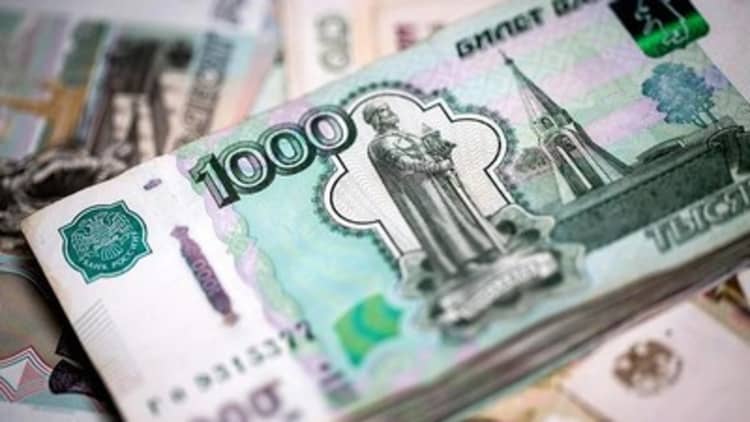
Russia won't be able to do anything to stanch the ruble's plunge if oil continues its months-long skid, the managing director of FX strategy at BK Asset Management told CNBC on Tuesday.
The Central Bank of Russia hiked interest rates by 6.5 percent, to 17 percent, in a bid to shore up the currency after its worst trading day in 15 years. The action briefly put a floor under the ruble, but it resumed its decline, plunging about 10 percent against the dollar in morning trade on Tuesday.
Read More Russian rate hike fails to halt ruble's fall
"It's tumbling because they can only control one part of the trade. Oil went down overnight and that killed their whole plan," BK Asset Management's Boris Schlossberg said in "Squawk Box." interview. "If oil stabilized right now, they'd get a little bit of breathing room. If we can't get any stabilization in oil, nothing they do will matter."
The one thing that would immediately stop the ruble's fall is something President Vladimir Putin has stipulated many times he would not do, Boris Jordan, CEO of the Sputnik Group, told "Squawk Box." That is to force exporters to sell 50 percent of their hard currency and buy rubles.
Releasing more foreign exchange reserves is one of the last options Russia has, Schlossberg added. The central bank released about $100 billion over the last month and has about $400 billion left, he said.

The ruble's plunge is currently driven by panic, reflecting a complete lack in confidence in Russia's central bank and the government, Jordan said. Russia watchers are "baffled" because the bank has been the economy's biggest stabilizer and one of the best-managed entities in the country for more than a decade, he added.
While the government has enough cash on hand, the $160 billion in foreign-denominated debt payments that Russian companies must service over the next 12 to 18 months could be a problem, he said.
"That is what everyone is worried about. You have a massive devaluation and you've got to repay $160 billion, and there's virtually no refinancing available to Russian companies on international markets due to the sanctions," Jordan said.
Schlossberg said the currency situation has the potential to turn into a geopolitical mess.
Read MoreWhy Russia's monster rate hike spells trouble ahead
"If Putin uses this as an excuse for further aggression, we could have some very, very serious problems going into next year," he said.
Jordan said Putin is unlikely to lash out aggressively and will instead focus on putting a cap on further inflation, which would curb his popularity at home. At current ruble rates, Russia is on track for double-digit inflation next year, he said.
Should the U.S. Federal Reserve decide it will tighten monetary policy, a huge flow into the dollar could follow, Schlossberg said. That could further weaken the ruble and cause "massive destabilization," he added.
The Federal Open Market Committee meets Tuesday and Wednesday before releasing a statement on monetary policy at the end of the meeting.


